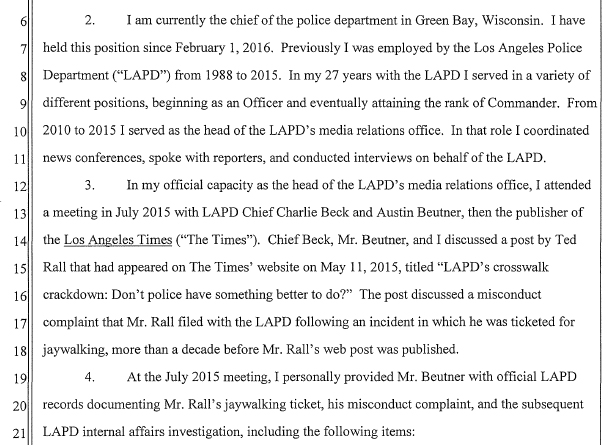Remember this the next time someone tells you it’s too easy to file a lawsuit in American courts. We need tort reform, but not to make it harder. It needs to become easier to seek justice!
As I wrote earlier, a judge in LA Superior Court ruled against me in the first round of anti-SLAPP motions filed against me by the LA Times. The Times is deploying anti-SLAPP — a law promoted as a way to protect whistleblowers and critics against wealthy corporations — against me because I am suing them for defamation and wrongful termination. (This was after they falsely claimed I had lied about being roughed up by an LAPD police officer in the course of a jaywalking arrest, and continued to lie after I used their own evidence to prove it. The Times and its publisher had a close financial and political relationship with the LAPD, which I had repeatedly criticized in my cartoons.)
On November 20 the ethics-impaired LA Times — terrified that my case might someday be heard before a jury of my peers — continued its scorched-earth litigation tactics and asked a judge to issue a judgement against me for about $350,000 of the Times’ legal fees. The fees included Times lawyer Kelli Sager’s $705/hour fee, which she described as “discounted.” It also included fees for preparing the anti-SLAPP motions themselves, which violated court rules by running 27+ pages instead of the allowed 15, and a previous judge threw out of court.
The Times also requested that I be forced to post an “appeals bond” equal to 1.5 times the value of the award, thus amounting to about $525,000. That bond would have to be posted in cash; in other words, I would need to send a bonding company 100% ($525,000) to post the bond in order to continue my case.
Remember: the Times is the defendant! They wronged me, not the other way around.
The judge ruled in the Times’ favor.
Corporate media takes care of its own, so I do not expect much solidarity from my fellow inked-stained wretches.

